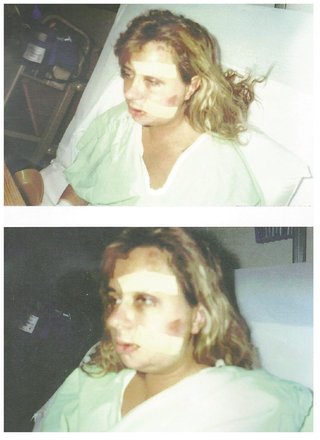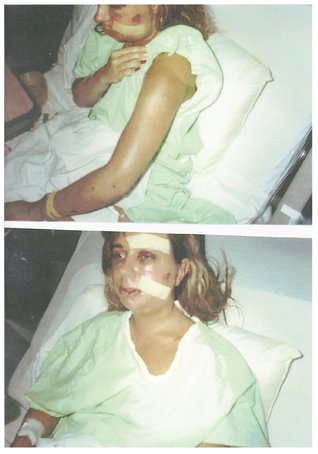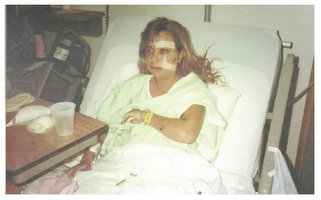She Survived (4 page)
Authors: M. William Phelps

CHAPTER 9
WHAT JUST HAPPENED?
As Melissa put
the phone receiver down on the table, got up, and, without thinking too much about how painful it was going to be, walked over and unlocked the front door, she never thought it could be her attacker trying to get back in.
the phone receiver down on the table, got up, and, without thinking too much about how painful it was going to be, walked over and unlocked the front door, she never thought it could be her attacker trying to get back in.
It wasn't, of course. Help had arrived finally.
“The poor sheriff 's deputy standing on the other side of the doorway,” Melissa later recalled, “turned completely white and almost couldn't get his gun unholstered.”
When he finally did, he asked, “Is the intruder still inside the apartment?”
Melissa hadn't even thought about it. If the door was still locked, maybe he was still inside, hiding somewhere.
Holy shit
.
.
The idea terrified her. The night was coming into perspective. Victims of violent crime often later discuss how, when they are in the moment, they don't feel as though they're victims of a crimeâthey don't comprehend the reality of what is taking place around them. The need to survive kicks in and they react to what is happening, instead. It's only after the situation begins to wind down that the gravity of such madness envelops a violent crime survivor. It is then he or she begins to have thoughts of what could have happened, what happened, and that true trauma kicks in as their post-crime life begins to come into focus.
That adrenaline rush of Melissa's stabilized. She was coming to terms with what had just taken place inside her apartment.
“I don't know,” Melissa said to the cop. “I have no idea if he's in here . . . but I . . . I . . . have to go back to the phone now.... I need to . . . I need to . . . lay down.”
The cop used his handheld radio to call for an ambulance.
“That's what I've been asking for all this time!” Melissa said as she walked back to her bedroom and fell on top of the blood-soaked bed.
When the paramedics arrived, they went to work. I couldn't understand why everyone was so upset. But the paramedics started with their usual speech: “We have to cut your nightgown off you.”
To which I replied, “That's fine. I don't have anything you haven't seen before, just in smaller amounts.”
He replied, “Well, we're trying to preserve your dignity.”
Of course, my response was “Dignity? Hell, after what I've just been through? I just want you to save my life.”
I heard the other paramedic calling in my vitals to the ER: “Yes, she's alert and coherent. She's cracking jokes.”
He was right; I was cracking jokes. At that point it was the only way I knew how to keep my sanity. I couldn't dwell on what had just happened. As they put me in the ambulance, they asked what hospital I wanted to go to. I said, “The nearest one would be nice.”
Understand that when I got to the ER, I still had no idea what I looked like, other than my arm was completely mangled and I thought it was broken. I knew my jaw was not moving properly, but I was still talking best I could. Nurses and doctors kept stopping by and asking if I was involved in a car accident. At one point they took me down for X-rays. I caught a glimpse of my face in the metal reflection on one of the machines and said, “Oh, I'm bleeding on my cheek.”
They told me, “No. In fact, that is the fatty tissue from the inside of your face coming out.”
CHAPTER 10
MY FRIEND
Melissa spotted a
doctor friend she knew and called out to him.
doctor friend she knew and called out to him.
He stopped at the foot of her bed and stared.
Do I know this woman
? he seemed to be thinking.
? he seemed to be thinking.
She had to tell him who she was.
“I was
that
unrecognizable.”
that
unrecognizable.”
Melissa's friend walked over and sat by her side, held her hand. Then he spent some time “putting that tissue back in my face until the surgeon on call could be reached.”
One of the paramedics visited Melissa after his shift to see how she was doing.
“I later found out it was because, quite frankly, no one had seen anything like this beforeânor had anyone expected me to live through the night/morning. He was so shaken by the whole incident. Come to find out later, apparently everyone who encountered me that night was quite shaken by the sight and details of what had happened. No one in this hospital had ever dealt with a trauma like this before.”

This series of photos was taken days after the attack. Melissa had undergone one surgery, with several more scheduled. With her face swollen, her jaw wired shut, stitches, bruises and cuts, Melissa was lucky to be alive. (
Photos courtesy of Marion County Prosecutor's Office
)
Photos courtesy of Marion County Prosecutor's Office
)


The actual trauma hospital at the time was in downtown Indianapolis. Melissa had requested not to go there.
As the night progressed, Melissa kept asking people she encountered what time it was. She had no idea when her assault had taken place or how long it had been since she arrived at the hospital. When hospital staffers asked whom they could call for Melissa, she told them to phone her former roommate, but it seemed like hours before he showed up.
It was now six the following morning when the surgeon came in and explained to Melissa the extent of her injuries.
“Your jaw,” he said, “was shattered. You are going to need surgery as soon as possible. We're going to have to wire your jaw closed.”
What puzzled the doctor as he sat and explained this to Melissa was the fact that she was still able to speak as well as she had been. Yet it was clear she was not moving her jaw while she talked.
“Somehow,” Melissa said in her humorous way of looking at all things in life, “through a sense of survival, I had learned ventriloquism in an instant.”
CHAPTER 11
SERIAL HOME INVADER
Law enforcement didn't
know it at the time, but there was a serial home invader roaming the streets in and around that apartment complex where Melissa lived. The guy was your typical scuzzy, loner type, preying on the neighborhood's lack of concern regarding locking their windows and doors at night. He was twenty-eight years old. At times he wore broad-rimmed, thick-lensed glasses with black frames, and parted what little greasy black hair he had to the side with a comb-over. He had beady rat eyes, a sharply featured, thin face, acne, and was about the size of a middle-school boy just hitting puberty. Not quite the monster of a man many had presumed attacked Melissa, but a guy who had nonetheless created fear and terror in those he had assaulted, not to mention the community around each attack site. Moreover, the size of the man did not make a difference when it came to the substantial nature of the injuries and pain Melissa suffered from. He had brought Melissa as close to possible death as she could have been.
know it at the time, but there was a serial home invader roaming the streets in and around that apartment complex where Melissa lived. The guy was your typical scuzzy, loner type, preying on the neighborhood's lack of concern regarding locking their windows and doors at night. He was twenty-eight years old. At times he wore broad-rimmed, thick-lensed glasses with black frames, and parted what little greasy black hair he had to the side with a comb-over. He had beady rat eyes, a sharply featured, thin face, acne, and was about the size of a middle-school boy just hitting puberty. Not quite the monster of a man many had presumed attacked Melissa, but a guy who had nonetheless created fear and terror in those he had assaulted, not to mention the community around each attack site. Moreover, the size of the man did not make a difference when it came to the substantial nature of the injuries and pain Melissa suffered from. He had brought Melissa as close to possible death as she could have been.
As Melissa sat in the hospital, thinking about the surgeries she now faced, the disfigurement of her face that would follow in the days to come, with law enforcement hanging around, looking to get in and speak with her, Mr. Peeping Tom was already planning and plotting his next attack.
I had no clue who did this to me. My jaw was broken, and the whole left side of my face had almost been obliterated. I finally placed two more phone callsâone to my mother and grandmother to let them know what had happened, so they could come down from [another county], and the second to my boss to let her know to take me off the schedule for a while.
My boss broke down in tears. I kept telling her everything was going to be okay. The bad thing was I had also just started another brand-new job as a receptionist and had only worked two days at that job and had to give it up, because it was my understanding that I probably wouldn't be able to speak for at least four to six weeks.
When they finally moved Melissa to an actual hospital room, the surgeon visited her again.
“Before I take you to surgery,” he asked, “do you have a picture of yourself? I, unfortunately, cannot tell from the damage what your face is supposed to look like in order to put it back together.”
This told the story of how badly Melissa had been beaten and injured. Her face was a mishmash of tissue, swollen beyond its normal size, Elephant Manâlike. She was horrified by the doctor's comments.
“I still had not seen myself,” Melissa recalled. “I finally had a nurse walk me to the restroom and it was the first time I saw the damage.”
The moment was traumatic.
“I now realized why everyone was so shocked,” Melissa recalled.
Looking into the mirror, she did not recognize herself. Imagine the impact? Not seeing yourself. Not being able to understand who you are. Suddenly you are someone elseâa stranger. And you realize somebody broke into your apartment and did this to you. Yes, you feel lucky to be alive. But you also feel your life will never be the same. Can never be the same.
The doctor told Melissa's mother and grandmother, who had arrived with a photo for the surgeon, that the surgery would take between one and two hours.
Four hours into it, they sat in the waiting room, worried that something had happened.
I came out with my jaws wired shut, stitches in two different stab wounds in my face. My arm and leg bandaged. Until my surgery, I had not slept. And after the surgery, even though I was sedated, I was terrified to fall asleep. So I didn't. I know I drifted off here and there out of pure exhaustion, because I would wake up to find a different person beside my bed each time. But if I slept, I did it during the daylight. At night I laid there in the bed, with the TV on, terrified.
Melissa had just walked through the door into her new world: post-traumatic stress disorder.
CHAPTER 12
OFFICIAL REPORT
Marion County Sheriff's
Department (MCSD) detective Carmie Godan was hanging around the hospital, waiting for the right time to go in and speak with Melissa. The patient's story would be more accurate the earlier cops were able to get it out of her. The better the detail, the better the chances they had of catching the scumbag. A guy like this, investigators figured, had done it before and would no doubt strike again. And at some point he was going to make a mistake.
Department (MCSD) detective Carmie Godan was hanging around the hospital, waiting for the right time to go in and speak with Melissa. The patient's story would be more accurate the earlier cops were able to get it out of her. The better the detail, the better the chances they had of catching the scumbag. A guy like this, investigators figured, had done it before and would no doubt strike again. And at some point he was going to make a mistake.
Had he made a mistake already, in Melissa's case? Carmie Godan wondered, walking in to interview Melissa.
“Can you kinda start from the beginning and tell me what happened?” Detective Godan asked.
Melissa wanted to tell her story. She wanted this man caught so, if nothing else, she could get some rest. PTSD comes on subtly, like a virus. It begins with questions, random thoughts, flashbacks, and then quickly, in most cases, escalates into hearing noises in a room and seeing things in the dark. This man, this maniac, had invaded Melissa's space. Melissa was not one to lie down and take it. She might have been terrified in those days after the attack, but her type A personality and resilient will would not allow her to roll over and allow this maniac to scare her into submission.
Later, Melissa would not have a hard time recalling what time her attack took place. “To this day,” she said over twenty years later, “I still wake up between one and two
every
morning.” So she assumed the attack happened then, her unconscious mind reminding her of it, night after night.
every
morning.” So she assumed the attack happened then, her unconscious mind reminding her of it, night after night.
Melissa explained to Detective Godan how several “blows to my head” awoke her. She had not heard the man enter her apartment. Godan wrote down everything she said. “I just remember something hit my head and I woke up. . . .”
Melissa then recalled her attacker's “shut up, bitch” comments. This was something she would never forget: those bullying words coming out of his mouth. She'd hear it, over and over; how he clenched his teeth, threatened and demeaned her all at once.
During the interview Melissa recalled that she had kicked her assailant in the face. She also now remembered being “slashed or stabbed” in the face. When she kicked him, Melissa now recalled, he tossed the weapon (hockey stick) he was beating her with. Thus, that kick wound up, one could say, saving her life.
Near the time that Melissa said, “I'm bleeding very badly,” she explained to Godan, was when he stopped attacking her. It was as if he had snapped out of some sort of daze and the reality of those wordsâand what he was doingâstopped him.
Strange behavior.
“And he jumped up and ran out . . . ,” Melissa explained through her own set of clenched teeth.
“Did you get a look at what he looked like?” Godan asked.
“No, I mean, I felt . . .” She thought about it. What
did
he look like? Continuing, Melissa described a “thin, bony” and “rather lightweight” man. “I think he had really short hair.... And when I grabbed at his face once, I'm pretty sure his face was kinda smooth.” She said she didn't think he had any acne. “But he was kinda sweating, so I don't know.... I think he had on jeans and a T-shirt, from what I could feel. . . .”
did
he look like? Continuing, Melissa described a “thin, bony” and “rather lightweight” man. “I think he had really short hair.... And when I grabbed at his face once, I'm pretty sure his face was kinda smooth.” She said she didn't think he had any acne. “But he was kinda sweating, so I don't know.... I think he had on jeans and a T-shirt, from what I could feel. . . .”

These photos show the porch/patio sliding glass door Melissa's attacker used to sneak into her apartment. Authorities believe he scaled the wall using a utility line. (
Photos courtesy of Marion County Prosecutor's Office
)
Photos courtesy of Marion County Prosecutor's Office
)
“Okay, so he got ahold of your underwear and he ripped them off, right?”
“Uh-huh.”
“Okay, did he . . . did he . . . Can you remember anything else that he said to you?”
This was important. Perps sometimes gave themselves away in what they said. Specific words could help investigators figure out personal things about a perp.
“He just kept saying, âShut up, bitch.' And he only said it, like, three timesâ”
“Did he say anything that he was going to do to you?”

“No.”
Melissa believed he was on the bed while he beat her. There weren't any lights on in the room, she told Godan.
“Okay . . . do you know how he got in there?” Godan wondered.
“I'm assuming through the patio window off of my balcony, 'cause that was the only thing that was open. I, unfortunately, left that open, cracked open ... 'cause the front door was still bolted, bolted and chained, when I let the police officers in.”
Considering what she had been through, Melissa's memory was remarkable. She was spot-on with just about every detail she offered police so far.
The other important item that came up as they talked through her terrifying ordeal was how Melissa's attacker might have snuck into the apartment before Melissa got homeâthat's why she didn't hear him come into her bedroom. Perhaps he was already inside, waiting for her to fall asleep. With respect to that theory, Godan asked if Melissa heard anything inside her apartment that night when she returned home. Were there any abnormal noises? Did she have a feeling that someone had either been in her apartment or something was different?
Melissa thought about it, but she couldn't recall anything for the cop. She couldn't even remember the moment he climbed on the bed or jumped on her.
“So maybe he was standing next to me when he started hitting me?” Melissa said.
They talked about race.
“No,” Melissa said. “I really honestly do not [know]” if he was black or white. But then a thought came to her: “. . . I think he was trying to make his voice sound more black, but I really don't know.”
She was certain he was on the “younger” side.
He never got undressed, nor did he take his pants down, Melissa said. She had scared him away before he could rape her.
“You don't have any idea who this guy would be?”
“No, I really don't.”
Other books
History of the Second World War by Basil Henry Liddell Hart
SeductiveTracks by Elizabeth Lapthorne
The Seventh Day by Joy Dettman
Revealing the Dragons (Stonefire Dragons #2.5) by Jessie Donovan
Nashville Noir by Jessica Fletcher
A Friend at Midnight by Caroline B. Cooney
Curves For The Lone Alpha (A Big Girl Meets Bad Wolf Romance) by Prince, Molly
One Foot in the Grave by Jeaniene Frost
Bikers Don't Use Brakes (Hellbirds Motorcycle Club) by Shaw, Adrienne
Tooth And Nail by Ian Rankin
